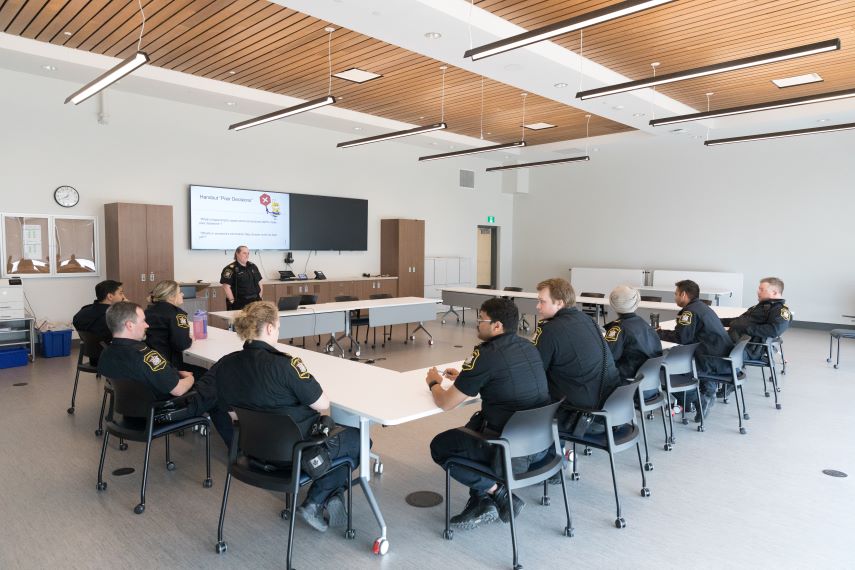Paid training
Correctional Officers are responsible for managing safe and secure custody of inmates and deliver programs that promote public safety and reduce recidivism.
On this page

Overview
Your first day of work begins in the classroom with other new officers.
A training officer delivers full-time, hands-on training over your first 33 days of employment.
To attain your correctional officer rank, your intensive basic training is followed by additional course work to be completed while you work as an active officer over the first 18 months of employment.
Exceptional training
The recruit training developed and delivered in partnership with the Justice Institute of British Columbia (JIBC) is dynamic and informative, providing new officers with the skills they need to manage inmates in correctional centres.
The training takes place in a correctional centre.
Mentoring program
There's a lot to learn in your first year of employment and some skills need time to develop and practice.
To support your continuous development, you'll be paired with a mentor who will answer questions and give advice and encouragement. Your mentor will be critical in assisting you with your transition into the correctional environment while increasing your confidence.
Training model
Week 1: Foundations
Introduces recruits to BC Corrections’ structure, standards, responsibilities, and core operational procedures. Training covers topics such as administrative processes, professional conduct, legal frameworks, security practices, and confidentiality, providing a solid foundation for advanced learning.
Week 2: Our Structure
Builds on foundational knowledge by introducing officers to security operations, emergency procedures, and inmate interactions within a correctional setting. Focuses on critical response skills, safety protocols, and professional practices to ensure officers can effectively manage operations and emergencies.
Week 3: People We Work With
Builds on security operations knowledge by focusing on inmate management, institutional services, and administrative procedures. Officers learn to handle complaints, maintain order, deliver essential services, and support rehabilitation efforts.
Week 4: Communication and Force Options
Develops participants’ skills in effective verbal and non-verbal communication techniques, conflict resolution, and appropriate use of force within a correctional environment. Participants engage in scenario-based training to develop their ability to de-escalate situations, apply BC Corrections Force Options Model, and use force legally, justifiably, and proportionally to ensure safety.
Week 5: Crisis Intervention and De-escalation
Prepares participants to manage hostile or aggressive individuals through crisis intervention strategies, appropriate use of force, and personal safety techniques. Practical drills and scenario-based exercises build proficiency in handling, deployment, and post-use procedures to ensure safety, minimize harm, and maintain policy compliance.
Week 6: Case Management
Introduces participants to the principles and processes of inmate case management, including admissions, discharges, classification, documentation, and release planning within the provincial correctional system. The training highlights the importance of protecting privacy, following the law when handling personal information, and collaborative release planning to help people succeed after custody while maintaining public safety.
Week 7: Putting It All Together
Hands-on wrap-up to the training program, where new officers apply learning in practice in the correctional environment. Participants shadow experienced officers, and perform actual job tasks, ask questions, and receive feedback in real time. This experience builds participant confidence and readiness so they’re fully prepared for graduation and their first shift on the job.
Basic Security Officer (graduation to 6 months)
The second part of Security Officer Training, called Basic Security Officer, runs for the six months after graduation. New officers continue developing their confidence and professionalism while they are working on the line. Training assignments are self-directed as well as scheduled facilitated sessions. On the job training allows new officers to develop their personal approach to the work, while becoming more comfortable with the routine and demands of the role.
Advanced Security Officer (6 months to 18 months)
Advanced Security Officer training begins after completion of Basic Security Officer training and equips security officers with specialized knowledge and skills required for progression to the correctional officer role. This phase builds on prior learning by deepening understanding of inmate issues to better support rehabilitation. Topics include working with special needs offenders, identifying and managing contraband, and developing core competencies such as teamwork and cooperation. Training is delivered through a blend of self-directed assignments and facilitated training days. Upon successful completion, security officers are promoted to the rank of correctional officer.
Join our team and get paid to train with us!
Apply to be a correctional officer
For more details about the recruitment process, email BCCorrections.Recruiting@gov.bc.ca.
